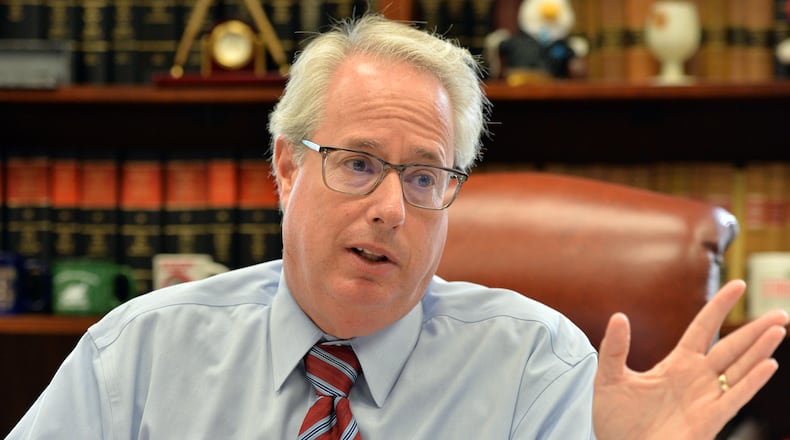The most curious facet of the debate over gay marriage is its violation of our usual requirement that social change occur at a pace that can only be detected with time-lapse photography.
On Wednesday, Attorney General Sam Olens indicated that, should the U.S. Supreme Court rule the way many suspect it will this summer, Georgia’s formal, legal antipathy to same-sex unions will vanish as quickly as the flick of a light switch.
High court arguments are scheduled for next week. A decision could come in late June. Georgia’s 2004 constitutional ban on gay marriage, which Olens is currently defending in federal court, will stand or fall with it.
“There’s a distinction between me defending the law and the order from the Supreme Court. When the Supreme Court rules on an issue, we’re going to follow the order,” Olens told the Atlanta Press Club.
“We’re going to encourage all those agencies that have a policy role that they immediately follow the law. I cringe just as much when an attorney general seeks to defy the law as anyone else,” he said. “When the U.S. Supreme Court rules, it’s not time for criticism. It’s not time for banter. It’s time for the lawyer to play lawyer and to ensure that everyone follows that law.”
That seems obvious, but it needed to be said.
Olens’ point was that we are not Alabama, where that state’s chief justice encouraged a revolt by probate judges — the ones who issue marriage licenses — when the U.S. Supreme Court refused to block gay weddings there two months ago.
Yet we are a state familiar with rear-guard actions. Georgia was still desegregating public schools decades after the 1954 Brown v. Board of Education decision that required an end to separate-but-equal classrooms.
Perhaps it is our protracted struggle over race that has made gay marriage appear, by comparison, a speeding marvel of inevitability. Eleven years ago, two-thirds of the state Legislature and 78 percent of Georgia voters declared a constitutional ban on same-sex unions to be a moral imperative.
Today, we have Republican presidential candidates struggling with Amy Vanderbilt-style questions over whether they would attend the nuptials of a gay couple — and, if so, would they wear business attire or something more casual?
Inevitability, the likelihood that gay marriage will be a settled issue before the first primary or caucus is held, has forced many a GOP candidate to temper his remarks.
Wisconsin Gov. Scott Walker has made it to a reception for a gay family member. U.S. Sen. Marco Rubio might attend a same-sex wedding, and he also believes that sexual preference is something one is born with. Former Florida Gov. Jeb Bush spoke of his respect for “couples making lifetime commitments to each other who are seeking greater legal protections.”
Georgia Republicans are in the same boat. On Wednesday, Olens wouldn’t address whether he might run for governor in 2018. But while he said he had no regrets about his defense of Georgia’s gay marriage ban, Olens also said he felt he had no discretion in the matter — and has tried to handle the issue in as balanced a manner as possible.
“In the case of same-sex marriage, I think our office has tried — as best as we can — to show compassion,” Olens said. The attorney general maintained that his opposition has stuck strictly to issues of legality.
What did he mean by that? Last year, several gay couples filed that federal lawsuit challenging Georgia’s 2004 ban on gay marriage. Olens filed a motion to dismiss the lawsuit in July. The argument now seems remarkable in its restraint.
“Plaintiffs may well be right that our nation is headed for a new national equilibrium on same-sex marriage,” Olens confessed in the 42-page court paper. Poll after poll shows this, he wrote.
“But judicially imposing such a result now would merely wrest a potentially unifying popular victory from the hands of supporters and replace it instead with the stale conformity of compulsion,” the Olens brief said.
If that line sounded a tad insincere, this one wasn’t: “The love that Plaintiffs articulate for their partners and children is clear, as are their contributions to our society. The State values Plaintiffs as its citizens, and readily acknowledges its responsibility to ensure that they, too, enjoy due process and equal protection under law.”
A federal judge rejected Olens’ argument for dismissal. Perhaps it was inevitable. And if one is making an argument that may already be lost, history appreciates those who do it with a certain amount of grace.
I asked Olens about his language after his press club talk. “We haven’t been hostile in any of our pleadings in the case. Our job is to answer legally, not emotionally,” he said. “There’s nothing wrong with showing compassion.”
About the Author
The Latest
Featured




